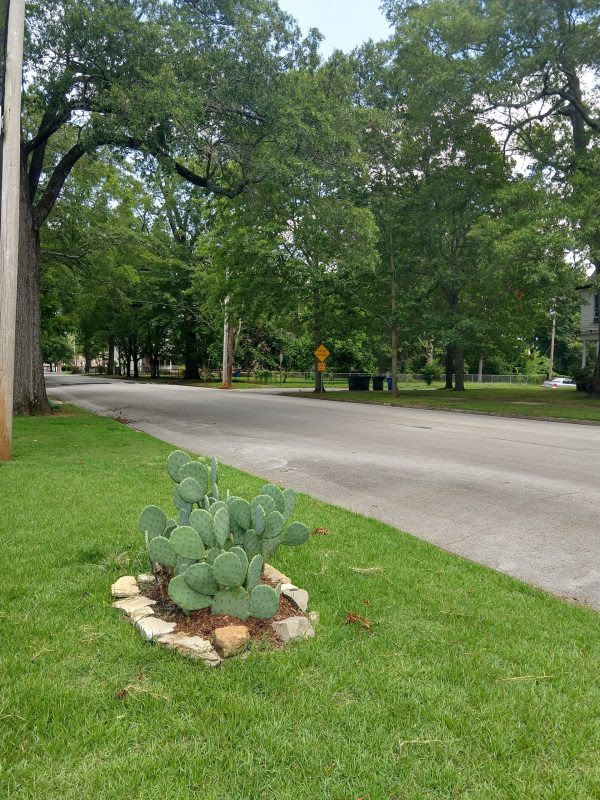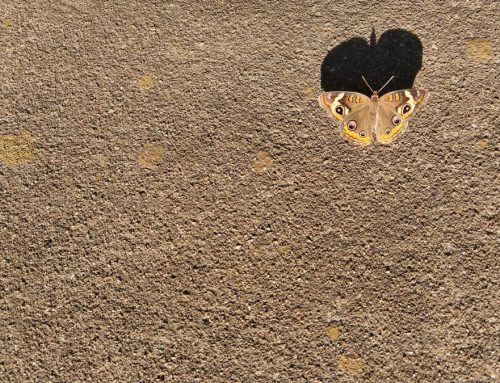I used to have so much trouble spending money “just for me.” It had nothing to do with how hard I worked, or how much I had in the bank.
Back when I was an undergraduate at Vassar College, I worked three jobs, volunteered, and tithed hundreds of dollars to my cultic church…yet I couldn’t pull the trigger on a $15 gift for myself. Self denial was ingrained into me at an early age, and by that point, it felt like safety.
Before I graduated, I wanted to buy a coffee mug from my favorite cafe, but I just couldn’t do it. Spending money that way was too anxiety-producing. Why do I feel guilty spending money on myself? I wondered.
It only took me about 10 years, but I did go back to that cafe for a mug. As I handed over my credit card, I felt a shimmer of the old fear: Was this a bad idea? But now I use my favorite mug every single morning. I’m so glad I made that purchase, particularly as the cafe has since closed.

Can you relate to this story? Are you the kind of person who wouldn’t think twice about getting a great gift for your best friend or your kid, yet you don’t feel like you have permission to buy something nice for yourself?
Self denial meaning
If so, then you probably struggle with self denial. Self denial means perpetually dismissing your own human needs in service of something you see as more important.
Certainly, there are times when some personal sacrifice becomes necessary in order to achieve your goals. If you want to nurse your babies, you’re going to sacrifice sleep; if you want to excel in athletics, you’ll sacrifice downtime to train.
However, I’d argue that self denial is a different, more dangerous animal.
At its core, self denial is about negating who you are. It’s disregarding who you are and how you’re made. It’s about believing that you should be different, you should be better, and you shouldn’t need things that other people need.
How do we come to believe these painful thoughts?
If you’re like me, you learned early on that showing your true needs and desires got you into trouble. And since you didn’t have a consistent experience of love and acceptance as a kid, you had to earn every bit of it with good behavior.
And if you grew up in an environment of strict religiosity, the stakes got even higher. You might have been explicitly told to live for others and sacrifice yourself.
You might have been taught to obey without question, no matter how you truly felt. To go without food, money, or love, all in the name of God. Because if you didn’t, you were “breaking God’s heart.” (That’s a direct quote from a dear friend of mine who also grew up in a cult.)
With conditions like these, is it any wonder that you learned that it wasn’t safe to put yourself first?
Is it any wonder that you don’t dare risk it now?
If you spent your formative years learning how to constantly need less and constantly give more, you had to develop a whole host of coping mechanisms and workarounds. These self-denying habits helped you to survive hard times, but now they’re keeping you trapped.
Such self denial is dangerous because it becomes such an ingrained response that we can’t see it clearly. Since we often go blind to the ways we deny ourselves, let me give you some examples of how it shows up.
Self denial examples
– Rationalizing how you’re living off so very little: “I’m OK with this, I can get by with this, this is good enough,” when it’s just crumbs. This shows up with under-earning and job choices, as well as in lopsided business partnerships and colleague relationships.
– Working too hard, rarely if ever taking a day off, and denying yourself rest (like the reader who wrote in for Working 14 hours a day to hopefully one day be successful?!).
– Not setting boundaries on your valuable time, even though you say, “My life is too crazy,” and “I want to do less.”
– Getting stuck in second-guessing and confusion (like the reader who wrote in for I need to work and earn money, but I have no clue what to do next.)
– Rarely if ever raising your rates or asking for a raise; not charging an amount that reflects the value you bring to your business. (Hint: Talk to a mentor about this; if you’re stingy with yourself, you’re probably undercharging!)
– Not allocating a “me money” line item in the budget, because even $15 purchases feel fraught. Whenever you try to spend money on yourself, you have to fight to convince yourself it’s okay (and the fight is exhausting).
Alternatively, you may have a pattern where you bounce between under-spending and overspending; you’re constantly going between extremes. Either you’re denying yourself basic needs and comforts, or you’re on a spending spree, with a guilt hangover afterward.
Either way, there’s a disconnect. Part of you is scared of losing control, and another part of you is desperate for some freedom. And since these parts are perpetually in conflict, it’s really uncomfortable.
Feel uncomfortable spending money?
In short, you feel so uncomfortable spending money because you are fighting a war within yourself. You have these different aspects and parts of yourself fighting for dominance — spend money! No, save money! – but there’s nothing steady to guide you.
It’s like being at a board meeting run by toddlers; in order to get anything done and keep everybody safe, you need an adult present. You need a calm, peaceful presence at the table, leading and directing the action.
In short, you need what Internal Family Systems (IFS) calls the presence of the Self. The Self (or soul, or Buddha nature, or Holy Spirit, or whatever you want to call it), is the calm, wise, curious, and infinitely loving presence at the center of your psyche.
When you bring the Self into your experience of money, everything changes.
There’s a fantastic example of this in the new testament scriptures, in the book of Matthew. You probably haven’t seen this passage cross-stitched on any samplers or printed on any inspirational posters, though, because it’s actually very subversive.
(Sidebar: Don’t worry, this post is not going to get preachy. I’m not religious at all anymore; I’m just using this story because it’s a good one.)
Jesus is telling a parable: A landowner hires a bunch of guys to work in his vineyard starting at various times throughout the day, then he goes and pays every worker the same amount regardless of how many hours they worked.
Predictably, the people who have been working all day are pissed off because others have worked less and received the same amount. But the landowner replies, “I am not being unfair to you, friend. Didn’t you agree to work for [a set amount]? Take your pay and go. I want to give the one who was hired last the same as I gave you.”
And then he speaks the line that gives me chills every time: “Don’t I have the right to do what I want with my own money?”
Of course the landowner has the right to do what he wants with his own money. It belongs to him. And of course you have the right to do what I want with YOUR own money. It belongs to YOU.
So often we forget about boundaries; we get into other people’s business and to let other people get into our business. We lose sight of the clear-eyed Self within the center of our psyches, the Self who knows that we’re fundamentally free to do what we want with our own time and money.
How to get over self denial (specifically, with regards to money)
The answer is simple, if not easy. It’s a two part process.
1. Ask yourself, “Don’t I have the right to do what I want with my own money?”
2. Practice living as though you have the right to do what you want with your own money.
Now, I can guess what you’re thinking here. But Caroline! It’s going to feel wildly uncomfortable!
Well, let me tell you a story to help. It’s about how I saw a cactus in my neighborhood. Now, this might not seem strange if you live in Arizona, but I live in northwestern Alabama. Here, a cactus is such an odd, incongruous sight that I took a picture.

Seeing this cactus made me think about how we spend so many years believing that we’re not allowed to follow our heart’s desires. That we can’t be so bold as to plant a cactus in Alabama (or quit a job, or take a day off, or spend money on ourselves).
But why not? Why don’t we? Usually, it comes down to this: Because even though I want to, it feels way too uncomfortable!
This is a good time to dispel a big myth about recovering from perfectionism and self-denial. The myth is that moving toward health and wholeness is always going to feel good in the moment. It’s not! It’s going to feel prickly, like brushing up against a cactus.
But beneath that initial discomfort, there’s an experience of freedom.
That’s what we look for. That’s how to get over self denial: practice experiencing something much more expansive.
The question is not, “Does this feel good in the moment?” Rather, the question is (thank you, Oliver Burkeman): “Does this choice enlarge me or diminish me?”
Deep down, does it feel like freedom? You already know the answer. But if you’re scared to move toward it – that’s understandable!
In order to move through the prickly discomfort of change, we need to do emotional-level work. Up until now, our unprocessed emotions have been keeping us stuck with regards to money. We’ve been arguing with ourselves about how we “should” feel, rather than feeling how we DO feel.
The good news is, we can learn to reconnect. We can learn to trust ourselves to feel any feeling that arises. I’ve walked hundreds of people through these emotional-work processes, and I’ve included many of them in my book, You Don’t Owe Anyone.
But you don’t even have to read the book to get started. You can begin with one exercise.
Toxic self denial keeps you small; it’s time to expand.
If you feel bad spending money on yourself, here’s what you do to practice breaking free.
- Mindfully, wisely set aside a specific amount of money for something you want to do.
- Go do the thing, go spend the money.
- Feel all the uncomfortable feelings that arise.
- Notice that you are OK. Notice that you are safe. Notice that you are loved.
Here’s a story of how this played out in my own life. In August 2024, I traveled to NYC to visit close friends. And as I waited for my second flight home, I bought myself sushi at the airport.
That may not sound like a big deal to you, but it was to me. You see, I spent a lot of my childhood in the Worldwide Church of God, which turned out to be a doomsday cult. There, I learned a lot about toxic self denial, fasting, and giving up to 30% of one’s pre-tax income to the church.
As you might imagine, spending $18 on airport sushi (and hundreds on the trip itself) doesn’t fit into that paradigm. In the past, it felt selfish, risky, even scary to me to buy food at the airport. So I almost never did it.
But on that trip, I did something different. Instead of getting super hungry by the time I get home, I got the sushi. I fed myself. And the crazy thing is: it actually felt natural! Why? Three reasons.
First, because I’ve learned how to not be so mean to myself anymore. I’ve unraveled a lot of the old limiting beliefs about self denial, and learned to apply love to the parts that hurt.
If you’re worried that it’s too late to grow your confidence this way – it’s not. It’s a skill you can learn. My experience working with hundreds of coaching clients is that it takes just a few minutes to feel better – and just a few months of consistent practice to feel like a new version of you.
Second, because I built an on-purpose business that frees me to travel and set my own schedule. (Ready to do that for yourself? Press play on the How to Start Your On-Purpose Business Now Masterclass to learn the 3 most essential steps to get started.)
Third, because I’ve built systems that support me in making money decisions quickly and easily. No more agonizing over whether it’s “right” for me to spend $11 on Christmas ornaments, $18 on sushi, or even $10k on coaching.
I used to feel so guilty spending money because even though I earned it, deep down it didn’t really feel like MY money. I didn’t feel like I had permission to do what I wanted with it. I didn’t think I could trust myself to handle it. So I felt guilty and afraid.
But after I learned to deal with the guilt and the fear…freedom felt amazing! Getting crystal clear on my priorities, and setting up structures that reflected them, was SO energizing!
For example: after years of telling myself I “shouldn’t” want to travel, I now have a designated travel bank account. A percentage of my business income goes into it regularly. Why? Because traveling with close friends is important to me. It’s a priority, and it gets to be treated as such.
So when I realized I was hungry at the airport, I knew I had more than enough set aside for any meal I wanted. The only question was whether or not I would choose to be good to myself.
I bought the sushi, and sat down to eat it with tears in my eyes. I thought of all the times I denied myself and my hunger, all the times I didn’t know how to feed myself.
It’s no exaggeration to say that simply sitting down with sushi felt like a sacred act. And I want you to have that too – the feeling of the whole world opening up.
Right now, I’d like to you to answer these two questions:
What would I do, if I knew that I was free?
And what would it take for me to make that dream come true?
Leave your reply in the comments.
Share This:
Comments
Related Posts



I think this is the same underlying issue:
We grew up with periods of little food (relying on food banks and the generosity of others). When I left home I (subconsciously) made the decision to buy whatever food I wanted when I wanted it. Now I will buy the food over any other, more important and necessary, items even though food scarcity is not an issue.
Oh, Bridget, I’m so sorry you went through that as a kid. It makes so much sense that you’d stock up on food now.
It reminds me of a story I heard, about children who had been through WWII bombings and experienced starvation. After they were rescued and safe, they were still terrified to go to sleep. Understandably, the kids were scared to wake up back in the nightmare of hunger they’d experienced already. Finally, someone realized that if the kids were given a piece of bread to hold in their hands at bedtime, they could relax enough to rest.
All of that to say, often the things we’re most afraid of are the things that have already happened. And the more we can give our bodies and minds evidence and reassurance that the past is done, the more we can come into the present moment.
So for you, it will be interesting to see: What do I need to feel safe and abundant around food? Stocking up is certainly part of it – but I wonder if there’s another meaningful gesture you could make to reassure your psyche that you are safe now…the Bridget-specific equivalent of bread in your hand at night…